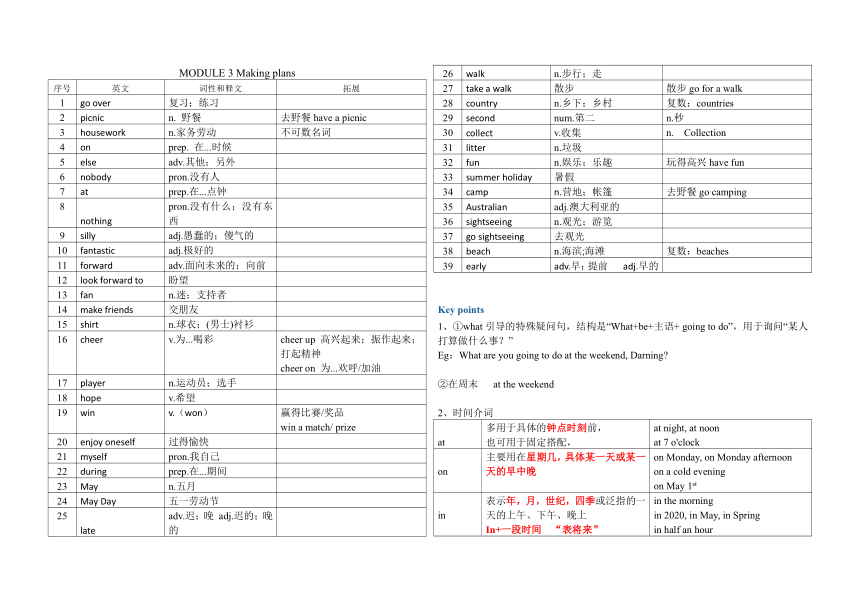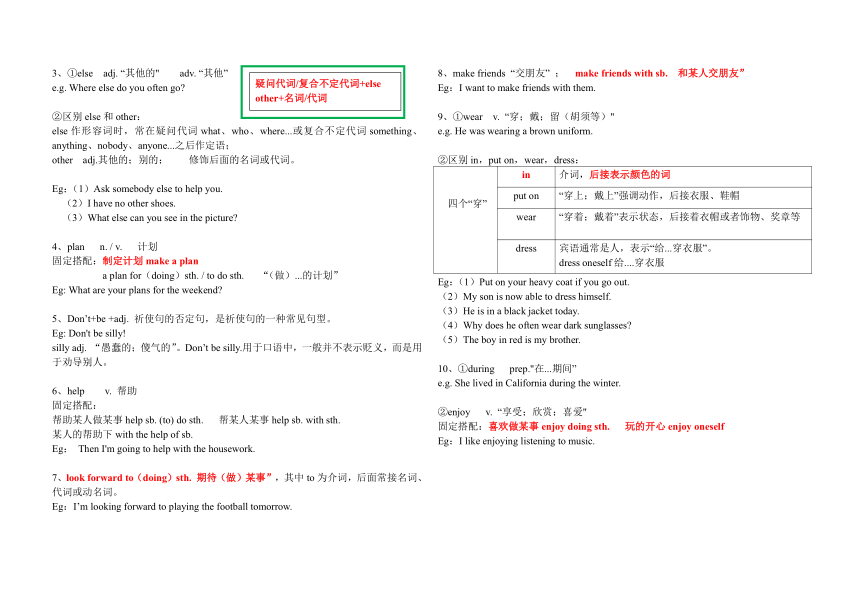外研版英语下册Module 3 Making Plans 知识归纳
文档属性
| 名称 | 外研版英语下册Module 3 Making Plans 知识归纳 |

|
|
| 格式 | docx | ||
| 文件大小 | 31.1KB | ||
| 资源类型 | 教案 | ||
| 版本资源 | 外研版 | ||
| 科目 | 英语 | ||
| 更新时间 | 2022-02-19 00:00:00 | ||
图片预览


文档简介
MODULE 3 Making plans
序号 英文 词性和释文 拓展
1 go over 复习;练习
2 picnic n. 野餐 去野餐have a picnic
3 housework n.家务劳动 不可数名词
4 on prep. 在...时候
5 else adv.其他;另外
6 nobody pron.没有人
7 at prep.在...点钟
8 nothing pron.没有什么;没有东西
9 silly adj.愚蠢的;傻气的
10 fantastic adj.极好的
11 forward adv.面向未来的;向前
12 look forward to 盼望
13 fan n.迷;支持者
14 make friends 交朋友
15 shirt n.球衣;(男士)衬衫
16 cheer v.为...喝彩 cheer up 高兴起来;振作起来;打起精神 cheer on 为...欢呼/加油
17 player n.运动员;选手
18 hope v.希望
19 win v.(won) 赢得比赛/奖品 win a match/ prize
20 enjoy oneself 过得愉快
21 myself pron.我自己
22 during prep.在...期间
23 May n.五月
24 May Day 五一劳动节
25 late adv.迟;晩 adj.迟的;晩的
26 walk n.步行;走
27 take a walk 散步 散步go for a walk
28 country n.乡下;乡村 复数:countries
29 second num.第二 n.秒
30 collect v.收集 n. Collection
31 litter n.垃圾
32 fun n.娱乐;乐趣 玩得高兴have fun
33 summer holiday 暑假
34 camp n.营地;帐篷 去野餐go camping
35 Australian adj.澳大利亚的
36 sightseeing n.观光;游览
37 go sightseeing 去观光
38 beach n.海滨;海滩 复数:beaches
39 early adv.早;提前 adj.早的
Key points
①what引导的特殊疑问句,结构是“What+be+主语+ going to do”,用于询问“某人打算做什么事?”
Eg:What are you going to do at the weekend, Darning
②在周末 at the weekend
时间介词
at 多用于具体的钟点时刻前, 也可用于固定搭配, at night, at noon at 7 o'clock
on 主要用在星期几,具体某一天或某一天的早中晚 on Monday, on Monday afternoon on a cold evening on May 1st
in 表示年,月,世纪,四季或泛指的一天的上午、下午、晚上 In+一段时间 “表将来” in the morning in 2020, in May, in Spring in half an hour
(
疑问代词/复合不定代词+else
other+名词/代词
)3、①else adj. “其他的" adv. “其他”
e.g. Where else do you often go
②区别else和other:
else作形容词时,常在疑问代词what、who、where...或复合不定代词something、anything、nobody、anyone...之后作定语;
other adj.其他的;别的; 修饰后面的名词或代词。
Eg:(1)Ask somebody else to help you.
(2)I have no other shoes.
(3)What else can you see in the picture
4、plan n. / v. 计划
固定搭配:制定计划make a plan
a plan for(doing)sth. / to do sth. “(做)...的计划”
Eg: What are your plans for the weekend
Don’t+be +adj. 祈使句的否定句,是祈使句的一种常见句型。
Eg: Don't be silly!
silly adj. “愚蠢的;傻气的”。Don’t be silly.用于口语中,一般并不表示贬义,而是用于劝导别人。
6、help v. 帮助
固定搭配:
帮助某人做某事help sb. (to) do sth. 帮某人某事help sb. with sth.
某人的帮助下with the help of sb.
Eg: Then I'm going to help with the housework.
7、look forward to(doing)sth. 期待(做)某事”,其中to为介词,后面常接名词、代词或动名词。
Eg:I’m looking forward to playing the football tomorrow.
8、make friends “交朋友” ; make friends with sb. 和某人交朋友”
Eg:I want to make friends with them.
9、①wear v. “穿;戴;留(胡须等)"
e.g. He was wearing a brown uniform.
②区别in,put on,wear,dress:
四个“穿” in 介词,后接表示颜色的词
put on “穿上;戴上”强调动作,后接衣服、鞋帽
wear “穿着;戴着”表示状态,后接着衣帽或者饰物、奖章等
dress 宾语通常是人,表示“给...穿衣服”。 dress oneself给....穿衣服
Eg:(1)Put on your heavy coat if you go out.
My son is now able to dress himself.
He is in a black jacket today.
Why does he often wear dark sunglasses
The boy in red is my brother.
10、①during prep."在...期间”
e.g. She lived in California during the winter.
②enjoy v. “享受;欣赏;喜爱"
固定搭配:喜欢做某事enjoy doing sth. 玩的开心enjoy oneself
Eg:I like enjoying listening to music.
一般将来时be going to
1、定义:一般将来时表示将来某个时间要发生的动作或存在的状态,将来经常或反复发生的动作,常与表示将来的时间状语连用。
2、构成:“be going to+动词原形”,其中be是有时态,人称和数的变化的。
时间标志词:tomorrow,next week / month / year, in the future (将来),in an hour / three days / weeks, some day (将来某一天)等。
结构 例句
肯定句 主语+be going to+动词原形+其他 I am going to travel next year.
否定句 主语+be not going to+动词原形+其他 We are not going to play the park tomorrow.
一般疑问句 Be+主语+going to+动词原形+其他? Is he going to have a vocation
特殊疑问句 特殊疑问词+一般疑问句? What are you going to do tomorrow
序号 英文 词性和释文 拓展
1 go over 复习;练习
2 picnic n. 野餐 去野餐have a picnic
3 housework n.家务劳动 不可数名词
4 on prep. 在...时候
5 else adv.其他;另外
6 nobody pron.没有人
7 at prep.在...点钟
8 nothing pron.没有什么;没有东西
9 silly adj.愚蠢的;傻气的
10 fantastic adj.极好的
11 forward adv.面向未来的;向前
12 look forward to 盼望
13 fan n.迷;支持者
14 make friends 交朋友
15 shirt n.球衣;(男士)衬衫
16 cheer v.为...喝彩 cheer up 高兴起来;振作起来;打起精神 cheer on 为...欢呼/加油
17 player n.运动员;选手
18 hope v.希望
19 win v.(won) 赢得比赛/奖品 win a match/ prize
20 enjoy oneself 过得愉快
21 myself pron.我自己
22 during prep.在...期间
23 May n.五月
24 May Day 五一劳动节
25 late adv.迟;晩 adj.迟的;晩的
26 walk n.步行;走
27 take a walk 散步 散步go for a walk
28 country n.乡下;乡村 复数:countries
29 second num.第二 n.秒
30 collect v.收集 n. Collection
31 litter n.垃圾
32 fun n.娱乐;乐趣 玩得高兴have fun
33 summer holiday 暑假
34 camp n.营地;帐篷 去野餐go camping
35 Australian adj.澳大利亚的
36 sightseeing n.观光;游览
37 go sightseeing 去观光
38 beach n.海滨;海滩 复数:beaches
39 early adv.早;提前 adj.早的
Key points
①what引导的特殊疑问句,结构是“What+be+主语+ going to do”,用于询问“某人打算做什么事?”
Eg:What are you going to do at the weekend, Darning
②在周末 at the weekend
时间介词
at 多用于具体的钟点时刻前, 也可用于固定搭配, at night, at noon at 7 o'clock
on 主要用在星期几,具体某一天或某一天的早中晚 on Monday, on Monday afternoon on a cold evening on May 1st
in 表示年,月,世纪,四季或泛指的一天的上午、下午、晚上 In+一段时间 “表将来” in the morning in 2020, in May, in Spring in half an hour
(
疑问代词/复合不定代词+else
other+名词/代词
)3、①else adj. “其他的" adv. “其他”
e.g. Where else do you often go
②区别else和other:
else作形容词时,常在疑问代词what、who、where...或复合不定代词something、anything、nobody、anyone...之后作定语;
other adj.其他的;别的; 修饰后面的名词或代词。
Eg:(1)Ask somebody else to help you.
(2)I have no other shoes.
(3)What else can you see in the picture
4、plan n. / v. 计划
固定搭配:制定计划make a plan
a plan for(doing)sth. / to do sth. “(做)...的计划”
Eg: What are your plans for the weekend
Don’t+be +adj. 祈使句的否定句,是祈使句的一种常见句型。
Eg: Don't be silly!
silly adj. “愚蠢的;傻气的”。Don’t be silly.用于口语中,一般并不表示贬义,而是用于劝导别人。
6、help v. 帮助
固定搭配:
帮助某人做某事help sb. (to) do sth. 帮某人某事help sb. with sth.
某人的帮助下with the help of sb.
Eg: Then I'm going to help with the housework.
7、look forward to(doing)sth. 期待(做)某事”,其中to为介词,后面常接名词、代词或动名词。
Eg:I’m looking forward to playing the football tomorrow.
8、make friends “交朋友” ; make friends with sb. 和某人交朋友”
Eg:I want to make friends with them.
9、①wear v. “穿;戴;留(胡须等)"
e.g. He was wearing a brown uniform.
②区别in,put on,wear,dress:
四个“穿” in 介词,后接表示颜色的词
put on “穿上;戴上”强调动作,后接衣服、鞋帽
wear “穿着;戴着”表示状态,后接着衣帽或者饰物、奖章等
dress 宾语通常是人,表示“给...穿衣服”。 dress oneself给....穿衣服
Eg:(1)Put on your heavy coat if you go out.
My son is now able to dress himself.
He is in a black jacket today.
Why does he often wear dark sunglasses
The boy in red is my brother.
10、①during prep."在...期间”
e.g. She lived in California during the winter.
②enjoy v. “享受;欣赏;喜爱"
固定搭配:喜欢做某事enjoy doing sth. 玩的开心enjoy oneself
Eg:I like enjoying listening to music.
一般将来时be going to
1、定义:一般将来时表示将来某个时间要发生的动作或存在的状态,将来经常或反复发生的动作,常与表示将来的时间状语连用。
2、构成:“be going to+动词原形”,其中be是有时态,人称和数的变化的。
时间标志词:tomorrow,next week / month / year, in the future (将来),in an hour / three days / weeks, some day (将来某一天)等。
结构 例句
肯定句 主语+be going to+动词原形+其他 I am going to travel next year.
否定句 主语+be not going to+动词原形+其他 We are not going to play the park tomorrow.
一般疑问句 Be+主语+going to+动词原形+其他? Is he going to have a vocation
特殊疑问句 特殊疑问词+一般疑问句? What are you going to do tomorrow
同课章节目录
- Module 1 Lost and found
- Unit 1 Whose bag is this?
- Unit 2 Are they yours?
- Unit 3 Language in use
- Module 2 What can you do ?
- Unit 1 I can play the piano
- Unit 2 I can run really fast
- Unit 3 Language in use
- Module 3 Making plans
- Unit 1 What are you going to do at the weekends?
- Unit 2 We're going to cheer the players.
- Unit 3 Language in use
- Module 4 Life in the future
- Unit 1 Everyone will study at home
- Unit 2 Every family will have a small plane.
- Unit 3 Language in use
- Module 5 Shopping
- Unit 1 What can I do for you?
- Unit 2 You can buy everything on the Internet
- Unit 3 Language in use
- Module 6 Around town
- Unit 1 Could you tell me how to get to the Nationa
- Unit 2 The London Eye is on your right.
- Unit 3 Language in use
- Revision module A
- Module 7 My past life
- Unit 1 I was born in a small village.
- Unit 2 I was born in Quincy.
- Unit 3 Language in use
- Module 8 Story time
- Unit 1 Once upon a time….
- Unit 2 Goldilocks hurried out of the house.
- Unit 3 Language in use
- Module 9 Life history
- Unit 1 He left school and began work at the age of
- Unit 2 He decided to be an actor.
- Unit 3 Language in use
- Module 10 A holiday journey
- Unit 1 What did you do?
- Unit 2 This morning we took a walk.
- Unit 3 Language in use
- Module 11 Body language
- Unit 1 They touch noses!
- Unit 2 Here are some ways to welcome them.
- Unit 3 Language in use
- Module 12 Western music
- Unit 1 It's so beautiful!
- Unit 2 Vienna is the centre of European classical
- Unit 3 Language in use
- Revision module B
